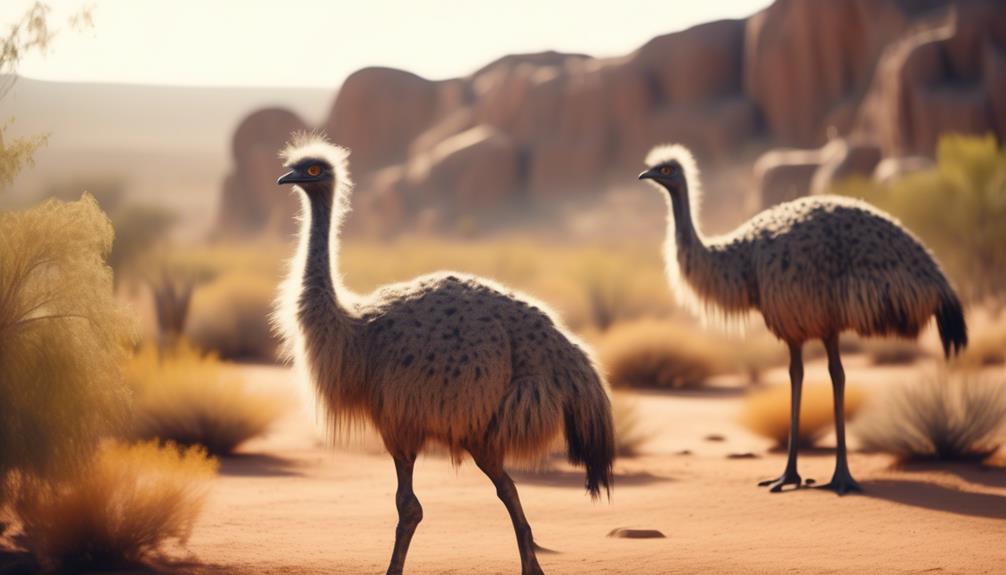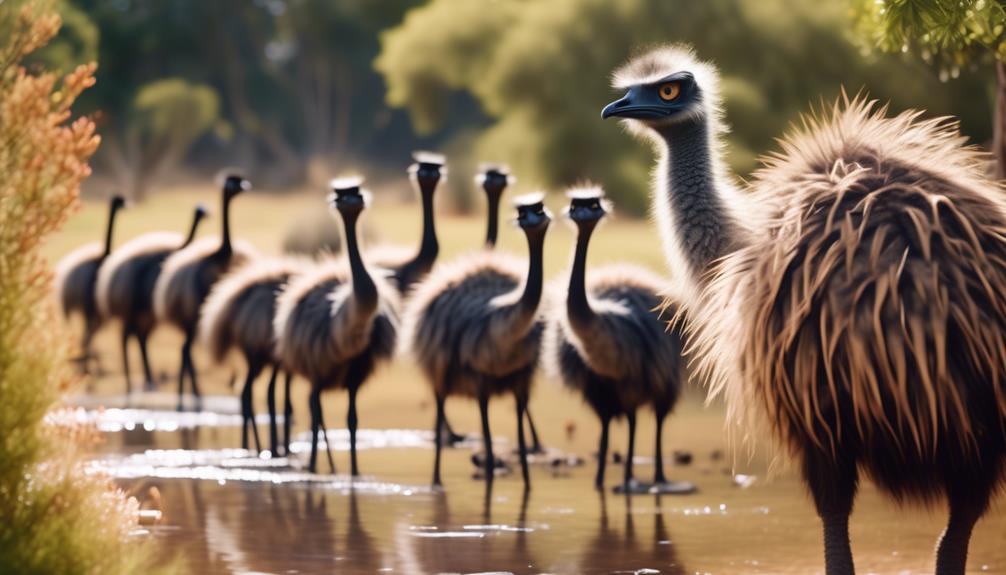
Imagine yourself in a time long ago, when ancient civilizations whispered tales of emus and their supposed immortality. Fascinating, isn't it? But what if the truth behind these myths could be unraveled?
In this exploration, we embark on a journey to separate fact from fiction, scientific evidence from legends passed down through generations. Prepare to have your preconceived notions challenged as we delve into the lifespan of emus, the factors that contribute to their longevity, and ultimately, debunk the myth of emu immortality.
Brace yourself for a fascinating revelation that will leave you questioning everything you thought you knew.
Key Takeaways
- Emus were revered as symbols of eternal life and spiritual transcendence in ancient civilizations, but scientific evidence debunks the myth of emu immortality.
- Emus have a finite lifespan and go through a natural life cycle, just like other living beings.
- Genetic factors, environmental influences, predation, disease, and human interference all affect emu longevity.
- Conservation efforts and human interventions, such as protected habitats and regulated hunting, contribute to the preservation of emu populations and their extended lifespan.
Ancient Origins of Emu Immortality Belief

The belief in the immortality of emus has its ancient origins deeply rooted in the cultural and mythological narratives of early civilizations. Emus, with their large size, distinctive appearance, and unique behaviors, have always captivated human imagination. In many ancient cultures, emus were revered as symbols of eternal life and spiritual transcendence. The origins of this belief can be traced back to the cultural significance attributed to emus in these early civilizations.
In ancient Mesopotamia, for example, emus were considered sacred creatures believed to possess the power of immortality. They were often depicted in art and mythology, representing the eternal cycle of life and death. The emu's ability to survive in harsh environments and endure long periods without food or water further reinforced the idea of their immortality.
Similarly, in ancient Egypt, emus were associated with the concept of resurrection and the afterlife. The emu's ability to lay large eggs was seen as a symbol of rebirth and regeneration. Emu feathers were also highly valued and used in religious rituals, symbolizing purity and divine protection.
Across different ancient civilizations, emus held a significant place in cultural beliefs, serving as powerful symbols of immortality, resilience, and spiritual transcendence. These beliefs not only reflected the awe-inspiring nature of emus but also provided a framework for understanding life, death, and the mysteries of the universe.
Myth Vs. Reality: Examining Scientific Evidence
Scientific analysis of emus has debunked the myth of immortality, providing evidence that contradicts ancient beliefs. Through genetic research and comparative studies, scientists have uncovered fascinating insights into the lifespan of emus. Here, we present the findings that dismantle the notion of emu immortality:
- Genetic research: By studying the DNA of emus, scientists have discovered that they don't possess any unique genetic traits that would grant them eternal life. Emus have a typical lifespan similar to other bird species, reaching an average of 10 to 20 years in the wild.
- Comparative studies: Comparisons with other long-lived bird species, such as parrots and albatrosses, have revealed that emus have a relatively shorter lifespan. While parrots can live for several decades and albatrosses for over 50 years, emus fall within the normal range for avian lifespans.
- Environmental factors: It has been observed that emus living in captivity tend to have longer lifespans than their wild counterparts. This suggests that factors such as predation, diseases, and limited resources in the wild contribute to the relatively shorter lifespan of wild emus.
- Aging process: Detailed studies of emu physiology have shown that they undergo a normal aging process, characterized by gradual decline in health and reproductive capabilities. This further supports the conclusion that emus aren't immortal.
Historical Accounts: Unraveling the Legends

Unraveling the legends surrounding emu immortality requires a meticulous examination of historical accounts, delving into the narratives and beliefs that have perpetuated this myth throughout the ages.
Cultural significance plays a crucial role in understanding the belief in emu immortality held by indigenous communities. Indigenous cultures often view the emu as a symbol of resilience and longevity, attributing immortality to this majestic bird. These beliefs are deeply rooted in their spiritual and cultural traditions, further highlighting the significance of the emu in their lives.
The influence of emu immortality can also be seen in various forms of art and literature. Historical works depict immortal emus as symbols of eternal life and divine power. Paintings and sculptures portray emus with regal features and mythical attributes, emphasizing their perceived immortality.
In literature, immortal emus often play key roles in epic tales and legends, representing the triumph of life over death and the eternal cycle of nature.
Lifespan of Emus: Dispelling the Immortality Myth
To dispel the myth of emu immortality, it's crucial to examine the lifespan of emus, shedding light on the reality of their mortality. Contrary to popular belief, emus aren't eternal beings. Here are four key factors that contribute to the lifespan of these majestic creatures:
- Genetic factors: Emus, like all living organisms, are subject to the influence of their genetic makeup. Just as some humans may inherit genes that predispose them to certain diseases or conditions, emus also have genetic variations that can affect their lifespan.
- Environmental influences: The environment plays a significant role in the lifespan of emus. Factors such as climate, habitat conditions, and availability of resources can impact their overall health and longevity. Emus living in harsh environments with limited food and water sources may have shorter lifespans compared to those in more favorable conditions.
- Predation and disease: Emus, despite their large size and formidable appearance, aren't invincible. They face threats from predators such as dingoes and feral dogs, which can significantly impact their survival. Additionally, emus are susceptible to various diseases and infections that can shorten their lifespan.
- Human interference: Human activities, such as habitat destruction, hunting, and vehicle collisions, pose significant risks to emus. These interactions with humans can lead to injuries and fatalities, further reducing their lifespan.
Understanding these factors is essential in debunking the myth of emu immortality. Emus, like all living beings, have a finite lifespan influenced by genetic factors, environmental conditions, predation, disease, and human interference.
Factors Contributing to Emu Longevity

Factors influencing the longevity of emus can be attributed to their genetic makeup, environmental conditions, predation risks, and human interactions.
Emus have evolved genetic factors that contribute to their long lifespan. Studies have shown that emus possess unique genetic adaptations that enhance their ability to resist diseases and maintain overall health. Additionally, their genetic makeup plays a crucial role in their dietary habits. Emus are herbivorous birds with a specialized digestive system that allows them to consume a wide variety of plant material. This diverse diet provides them with essential nutrients and antioxidants, which contribute to their overall well-being and longevity.
Environmental conditions also play a significant role in emu longevity. Emus are native to Australia, where they've adapted to survive in various habitats, including arid and semi-arid regions. These environments provide emus with ample food resources and shelter, allowing them to thrive and live longer. Furthermore, emus have evolved to be highly resilient to predation risks. They possess strong legs and powerful kicks, which serve as a defense mechanism against potential predators. This ability to defend themselves significantly reduces their risk of predation, thereby contributing to their prolonged lifespan.
Human interactions can also influence the longevity of emus. Conservation efforts, such as protected habitats and regulated hunting, have contributed to the preservation of emu populations. Additionally, human interventions, such as proper healthcare and nutrition, can enhance the overall health and lifespan of emus in captivity. However, it's essential to strike a balance between human interventions and allowing emus to retain their natural behaviors and instincts.
Conclusion: Debunking the Myth of Emu Immortality
Contrary to popular belief, the notion of emu immortality is nothing more than a misguided myth. While emus are known for their impressive lifespan and ability to withstand harsh environments, they aren't exempt from the natural process of aging and mortality. Let's now delve into the reasons why the myth of emu immortality should be debunked:
- Scientific evidence: Extensive research conducted on emus has provided concrete evidence that they don't possess the ability to live forever. Like all living beings, emus also experience aging and eventual death.
- Life cycle: Emus go through a life cycle similar to other organisms, starting as an egg, hatching into a chick, and growing into an adult. This natural progression clearly indicates that emus aren't immortal beings.
- Cultural significance: The myth of emu immortality has gained significance in various cultures around the world, often symbolizing eternal life or divine power. However, it's crucial to distinguish between cultural beliefs and scientific realities.
- Symbolism in mythology: Emus have been associated with symbolism in mythology, representing different concepts such as rebirth, resilience, and strength. While these symbolic interpretations add depth to cultural narratives, they shouldn't be mistaken for literal immortality.
Frequently Asked Questions
What Is the Average Lifespan of an Emu?
The average lifespan of an emu is influenced by various factors such as habitat, diet, and predation. Emus typically live for around 10-20 years in the wild, but can reach up to 30 years in captivity.
Are There Any Documented Cases of Emus Living Longer Than the Average Lifespan?
Are there any documented cases of emus living longer than the average lifespan? While the emu aging process is not well understood, potential factors affecting emu lifespan include genetics, diet, and environmental conditions.
Do Emus Exhibit Any Unique Behaviors or Adaptations That Contribute to Their Longevity?
Emus, with their unique mating habits and diet, exhibit behaviors and adaptations that contribute to their longevity. By carefully selecting their mates and consuming a varied diet, emus maximize their chances of living a long and healthy life.
Are There Any Specific Environmental Factors That Support Emu Longevity in the Wild?
Specific environmental factors play a crucial role in supporting emu longevity in the wild. These factors include suitable diet and habitat requirements, genetic factors that promote survival, and effective predator avoidance strategies. Understanding these factors contributes to our knowledge of emu immortality.
How Do Emus Compare to Other Bird Species in Terms of Lifespan and Longevity?
When comparing bird lifespans, it is important to consider the factors affecting emu longevity. Emus, like other bird species, vary in lifespan due to genetic, environmental, and ecological factors.
Conclusion
In conclusion, the belief in the immortality of emus has been debunked through scientific evidence and historical accounts. Contrary to popular myth, emus do have a finite lifespan and aren't immune to aging.
Factors such as their genetic makeup, diet, and habitat play a crucial role in their longevity. By unraveling the truth behind the legends, we gain a deeper understanding of the natural world and the fascinating creatures that inhabit it.




